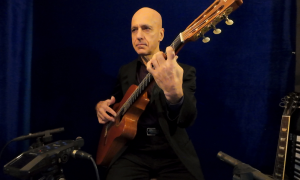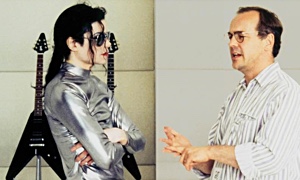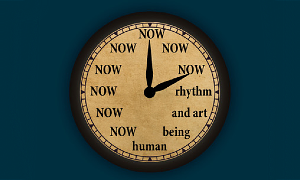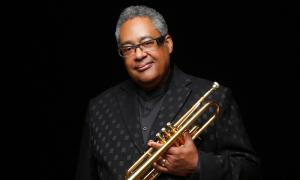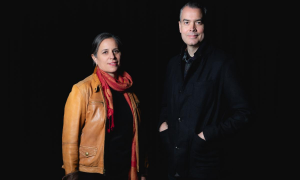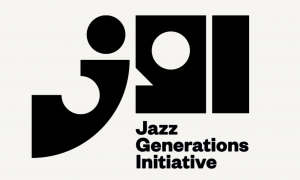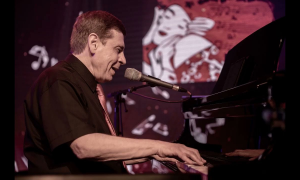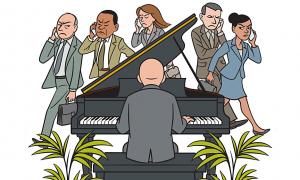By Steve Provizer
I just received a copy of the book Coltrane on Coltrane, edited by Chris DeVito. There are a number of interviews here-especially European and Japanese-that I'd never seen. Also, some good candids that I don't think had been published. Chris included an interview I did with Isadore Granoff, who ran the Granoff Studios in Philadelphia, where Trane got early musical training. Aside from an ego stake, I don't have a piece of the action and have no trouble shilling for it. The book is worth picking up.
In this post, I'll put “Coltrane On Coltrane" in the context of a previous posting about Jazz Neurosis.
Like many people-not just musicians-I have always felt as though I had an intense emotional bond with Trane. It might sound trite, but when I heard “A Love Supreme" at age 15, I had the first inkling of why someone-anyone-might understand the reason they've been put on the planet. I know many of you have similar stories. “A Love Supreme" certainly presented a heightened version of the person John Coltrane, but it seemed to me, as I learned more about Trane's life, that it was not a trumped up public-image-conscious package. It was representative of who the man actually was. Interview after interview in “Coltrane On Coltrane" reaffirms that.
Music was obviously the core and driver of Trane's life, but despite romantic projections, that does not mean that his life was any less fraught than yours or mine. Apart from all the concerns of running a band, responsibility for recordings, touring and dealing with a family, he had to deal with an incessant barrage of often inane questions by the media. Throughout all of that, Trane's grace and humanity reassert themselves over and over. One simply marvels at Coltrane's patience and humility. Long after I know I would have thrown a mic stand at one of these interlocutors, Trane continues to find a way to respond that rescues them from the embarrassment of realizing how idiotic they are.
So, referring back to my post on neurosis and jazz-Yes, Coltrane was afflicted in a similar fashion. At the beginning of his career he emulated others, Bird and Lester especially, but by the mid-late 1950's, he'd begun the task of trying to clarify and externalize a sound inside his own head. And, wherever that sound moved, he had the courage to follow.
The miraculous aspect is that Coltrane was able to undertake this titanic psychic struggle seemingly without projecting any crap onto those around him-even after the deification process had begun. As history and many clay-footed gurus have shown us, that ain't easy.
I just received a copy of the book Coltrane on Coltrane, edited by Chris DeVito. There are a number of interviews here-especially European and Japanese-that I'd never seen. Also, some good candids that I don't think had been published. Chris included an interview I did with Isadore Granoff, who ran the Granoff Studios in Philadelphia, where Trane got early musical training. Aside from an ego stake, I don't have a piece of the action and have no trouble shilling for it. The book is worth picking up.
In this post, I'll put “Coltrane On Coltrane" in the context of a previous posting about Jazz Neurosis.
Like many people-not just musicians-I have always felt as though I had an intense emotional bond with Trane. It might sound trite, but when I heard “A Love Supreme" at age 15, I had the first inkling of why someone-anyone-might understand the reason they've been put on the planet. I know many of you have similar stories. “A Love Supreme" certainly presented a heightened version of the person John Coltrane, but it seemed to me, as I learned more about Trane's life, that it was not a trumped up public-image-conscious package. It was representative of who the man actually was. Interview after interview in “Coltrane On Coltrane" reaffirms that.
Music was obviously the core and driver of Trane's life, but despite romantic projections, that does not mean that his life was any less fraught than yours or mine. Apart from all the concerns of running a band, responsibility for recordings, touring and dealing with a family, he had to deal with an incessant barrage of often inane questions by the media. Throughout all of that, Trane's grace and humanity reassert themselves over and over. One simply marvels at Coltrane's patience and humility. Long after I know I would have thrown a mic stand at one of these interlocutors, Trane continues to find a way to respond that rescues them from the embarrassment of realizing how idiotic they are.
So, referring back to my post on neurosis and jazz-Yes, Coltrane was afflicted in a similar fashion. At the beginning of his career he emulated others, Bird and Lester especially, but by the mid-late 1950's, he'd begun the task of trying to clarify and externalize a sound inside his own head. And, wherever that sound moved, he had the courage to follow.
The miraculous aspect is that Coltrane was able to undertake this titanic psychic struggle seemingly without projecting any crap onto those around him-even after the deification process had begun. As history and many clay-footed gurus have shown us, that ain't easy.










